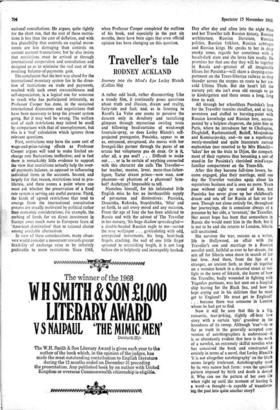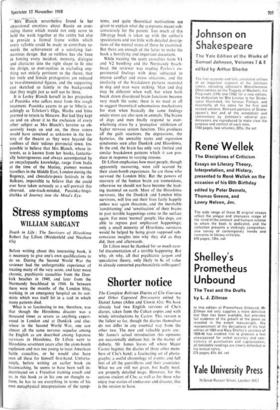Traveller's tale
RODNEY ACKLAND
A rather odd book, rather disconcerting. Like a trendy film, it continually poses questions about truth and illusion, dream and reality, fairy-tale and fact; and, as in listening to Ravel's La Valse one seems to perceive the dancers only in desultory and tantalising glimpses through mysterious swirling mists and billowing bead-curtains of windswept fountain-spray, so does Lesley Blanch's self- projected protagonist, Pussinka, appear to us as, entranced, enraptured, she moves with her Svengali-like partner through the paces of an erratic but voluptuous pas de deux. Or is it, after all, a pas seul? . . . Difficult to make out . . . or to be certain of anything connected with this character she calls The Traveller— her teacher, mentor, lover, more-than-father- figure, Tartar dream prince—now man, now phantom—or phantom of a phantom? Sym- bol? Archetype? Impossible to tell.
Nameless himself, for his infatuated little English miss he has an inexhaustible supply of pet-names and diminutives: Pussinka, Doucinka, Rokoska, Stupiditchka, 'Miss' and so forth, to suit every mood and any occasion. From the age of four she has been addicted to Russia and with the advent of The Traveller in her nursery, 'his huge shadow spreadeagled- a double-headed Russian eagle to me—across the rosy wallpaper . . . gesticulating with odd, unexpected movements, his long, bent-back fingers cracking, the nail of one little finger sprouted to astonishing length, it is not long before she is helplessly and inescapably hooked. Day after day and often into the night Puss and her Traveller talk Russian history, Russian architecture, Russian literature, Russian politics, Russian folklore, Russian cabbages and Russian kings. He speaks to her in deep smoky tones, regards her sometimes with a
basalt-dark stare and she loves him madly. He promises her that one day they will be together in Russia and—greatest of all imaginable
blisses for Pussinka—will share a sleeping-com- partment on the Trans-Siberian railway as they thunder across the steppes en route to her ice.
cold Ultima Thule. But she hasn't left the nursery yet; she isn't even old enough to go to kindergarten and there seems a long, long time to wait.
All through her schooldays Pussinka's love for the Traveller remains steadfast, and at last, seventeen and stuffed to bursting-point with Russian knowledge and Russian lore, accom- panied by a helpless chaperon, she joins him in Paris, where he introduces her to Chaliapine, Diaghileff, Rachmaninoff, Baileff, Mosjoukine and Komisarjevsky, and—to use a repellently mealy-mouthed and quite inaccurate current euphemism (not resorted to by Mrs Blanch)— `takes' her on the train to Dijon, the compart- ment of their raptures thus becoming a sort of stand-in for Pussinka's cherished mind's-eye. familiar cpmpartment on the Trans-Sib.
After this they become full-time lovers, be- come engaged, plan their marriage, until one day the Traveller vanishes again about his mysterious business and is seen no more. Years pass without sight or sound of him, but Pussinka has never given up her childhood's dream and sets off for Russia at last on her own. Though not alone entirely for, throughout her journeyings, she is conscious always of a presence by her side, a 'revenant,' the Traveller. Her secret hope has been that somewhere in Russia she would meet him in the flesh, but it is not to be and she returns to London, Siberia still unattained.
She survives the war, success as a writer, life in Hollywood, an affair with the Traveller's son and marriage to a Russian novelist until, faithful as ever to her dream, she sets off for Siberia once more in search of her lost love. And there, from the lips of a stranger, an ancient Serb, as they sit together on a wooden bench in a deserted street at twi- light in the town of Irkutsk, she learns of how the Traveller, badly wounded in fighting with Yugoslav partisans, was last seen on a hospital ship leaving for the Black Sea, and how he kept crying out in his delirium that he must get to England! He must get to England! . . . because there was someone in London whom he had got to find.
Now it will be seen that this is a big, romantic, tear-jerking, slightly off-beat love story with a certain 'epic' grandeur in the broadness of its sweep. Although `true'—in so far as truth in the generally accepted con- vention of autobiographers is understood—It is so abundantly evident that here is the work of a novelist, an extremely skilful novelist who has conceived the book and constructed it entirely in terms of a novel, that Lesley Blanch's `it is not altogether autobiography' on the blurb seems largely irrelevant. Autobiography must by its very nature lack form: even the specious pattern imposed by birth and death is denied it. Who can see the pattern of her own life when right up until the moment of leaving
a word—a thought—is capable of transform- ing the past into quite another story?
Mrs Blanch nevertheless found in her obsessional emotions about Russia an over- riding theme which would not only serve to hold the work together at the centre but also to provide a formal frame within which every syllable could be made to contribute to- wards the achievement of a satisfying har- monious design. But so ruthless has she been in forcing every incident, memory, dialogue and character into the right shape to fit into the design, so over-zealous in excluding any- thing not strictly pertinent to the theme, that her male and female protagonists are reduced to two-dimensional figures, and the supporting cast sketched so faintly in the background that they might just as well not be there.
It is Lesley Blanch herself in her projection of Pussinka who suffers most from this rough treatment. Pussinka yearns to go to Siberia as achingly as Tchekov's Olga, Masha and Irina yearned to return to Moscow. But had they kept on and on about it to the exclusion of every other subject as Mrs Blanch's heroine so ob- sessively keeps on and on, the three sisters would have remained as unknown in the his- tory of the theatre as they were beyond the confines of their tedious provincial town. Im- possible to believe that Mrs Blanch, whose in- terests, as is known from her books, fantastic- ally heterogeneous and always accompanied by an encyclopaedic knowledge, range from India at the time of the Mutiny, pioneer women travellers in the Middle East, London during the Regency, and chocolate-penis festivals in the Balkans, impossible to believe that she could ever have taken seriously as a self-portrait this obsessed, one-track-minded, Pussinka-Stupi- ditchka of Journey into the Mind's Eye.







































 Previous page
Previous page